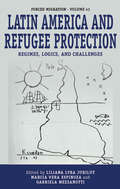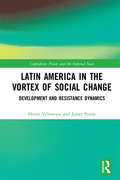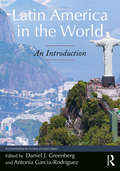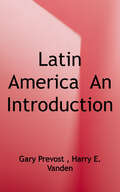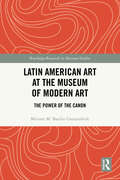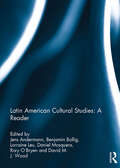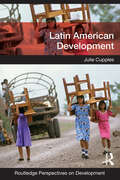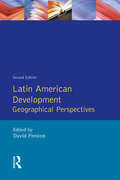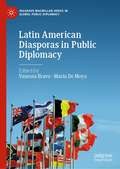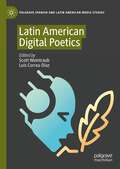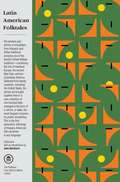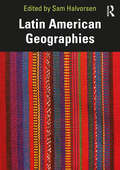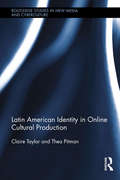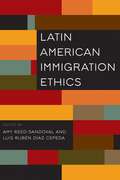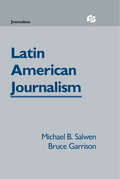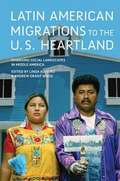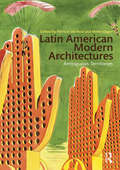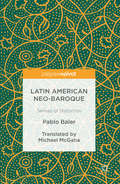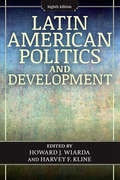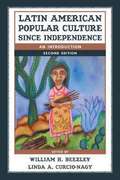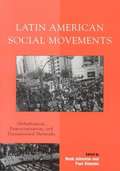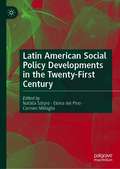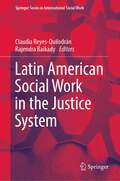- Table View
- List View
Latin America and Refugee Protection: Regimes, Logics and Challenges (Forced Migration #41)
by Liliana Lyra Jubilut, Marcia Vera Espinoza and Gabriela MezzanottiLooking at refugee protection in Latin America, this landmark edited collection assesses what the region has achieved in recent years. It analyses Latin America’s main documents in refugee protection, evaluates the particular aspects of different regimes, and reviews their emergence, development and effect, to develop understanding of refugee protection in the region. Drawing from multidisciplinary texts from both leading academics and practitioners, this comprehensive, innovative and highly topical book adopts an analytical framework to understand and improve Latin America’s protection of refugees.
Latin America and Refugee Protection: Regimes, Logics, and Challenges (Forced Migration #41)
by Liliana Lyra Jubilut, Marcia Vera Espinoza and Gabriela MezzanottiLooking at refugee protection in Latin America, this landmark edited collection assesses what the region has achieved in recent years. It analyses Latin America’s main documents in refugee protection, evaluates the particular aspects of different regimes, and reviews their emergence, development and effect, to develop understanding of refugee protection in the region. Drawing from multidisciplinary texts from both leading academics and practitioners, this comprehensive, innovative and highly topical book adopts an analytical framework to understand and improve Latin America’s protection of refugees.
Latin America in the Vortex of Social Change: Development and Resistance Dynamics (Capitalism, Power and the Imperial State)
by Henry Veltmeyer James PetrasThis book explores the dynamics of the recent ‘progressive cycle’ in Latin American politics, associated with a red and pink tide of regime change. With this cycle of centre-left regimes oriented towards an alternative post-neoliberal form of development now coming to an end, coinciding with the end of a ‘primary commodities boom’ (the demand for natural resources exported in primary form on the world market), the authors seek to explore the dynamics of the transition from a progressive cycle of regimes oriented towards the search for a more inclusive form of development towards what appears to be another swing in the pendulum of electoral politics towards the far right and a return to neoliberal orthodoxy. Within the vortex of forces of change pushing towards both the Left and the Right, Latin America lies at the centre of ongoing heated theoretical and political debates as to how to bring about a more inclusive and sustainable form of post-neoliberal and post-capitalist development. Latin America in the Vortex of Social Change crucially aims to cut through these debates and explore the dynamics of the forces of change at work in the current conjuncture of capitalist development. With reference to a theoretical framework based on the interaction of three different forms of capitalism (capitalism as usual, extractive capitalism, narco-capitalism), the authors proceed to an analysis of the development and resistance dynamics of the development process that is unfolding on the Latin American political landscape. The book will appeal to scholars of political sociology and political theory with an interest in the political economy of development and Latin American affairs.
Latin America in the World: An Introduction (Foundations in Global Studies)
by Antonia Garcia-Rodriguez Daniel J. GreenbergFrom the Foundations in Global Studies series, this text offers students a fresh, comprehensive, multidisciplinary entry point to Latin America. After a brief introduction to the study of the region, the early chapters of the book survey the essentials of Latin American history; important historical narratives; and the region’s languages, religions, and global connections. Students are guided through the material with relevant maps, resource boxes, and text boxes that support and guide further independent exploration of the topics at hand. The second half of the book features interdisciplinary case studies, each of which focuses on a specific country or subregion and a particular issue. Each chapter gives a flavor for the cultural distinctiveness of the particular country yet also draws attention to global linkages. Readers will come away from this book with an understanding of the larger historical, political, and cultural frameworks that shaped Latin America as we know it today, and of current issues that have relevance in Latin America and beyond.
Latin America: An Introduction
by Harry E. Vanden Gary PrevostThis book offers a contemporary, thematic analysis of the region that is grounded in Latin America's social, political, economic, and cultural past. <p><p>Based on chapters from Harry Vanden and Gary Prevost's popular text, Politics of Latin America, this book provides an accessible and interesting discussion of a broad range of topics, including democracy, revolution, indigenous populations, culture, gender, religion, politics, economy, and relations with the United States. Unlike many texts on the region, this book places the voices of long-ignored and previously marginalized groups in Latin America--women, indigenous peoples, Afro-Latinos, workers, peasants, and gays and lesbians--at the heart of its analysis. Offering balanced regional coverage, the book discusses such recent political, social, and economic developments as the failure of the neoliberal economic policies of the 1980s and 1990s to deliver promised prosperity; the related resurgence of progressive politics in the region, as manifested in the election of numerous left and center-left governments; and the strong role of numerous social movements in setting the region's political agenda in the new century. <p><p>The authors analyze the continuing power of the United States in the region, as seen in the implementation of the Central America Free Trade Agreement (CAFTA), bilateral trade agreements with Chile and Peru, and the continued funding of Plan Colombia. They also discuss the role of various Latin American-based initiatives, including the expansion of MERCOSUR, the Bolivarian Alternative, and The Bank of the South. Providing a historical perspective for the challenges and problems facing the region today, Latin America: An Introduction's regionally balanced, multidisciplinary approach makes it an ideal text for introduction to Latin American studies courses.
Latin American Art at The Museum of Modern Art: The Power of the Canon (Routledge Research in Museum Studies)
by Miriam M. Basilio GaztambideThis book sheds light on an as-yet unstudied aspect of The Museum of Modern Art’s (MoMA) preeminent role in establishing the definition of the problematic term “Latin American art” in the United States from the 1930s to the present through its collection displays. In examining the shifting categorization of Latin American works according to stylistic and geographic taxonomies, we gain a greater understanding of the organization of the Museum’s collections as a whole during the 1940s and 1950s. This book is the first to document these institutional precedents, crucial for the understanding of the articulation of a Modernist canon and its contested legacy today.The MoMA is widely recognized as the preeminent institution that defined 20th-century art through its collection – shaping our understandings of the history of art, with its hierarchies and exclusions, as they sediment over time. MoMA’s holdings of art from Latin America shed light on a key period when the stylistic categories that have since come to be accepted by many today as the Modernist canon developed. MoMA’s collection displays suggest ways in which artists from areas of the world formerly excluded can be incorporated within today’s increasingly global museums. MoMA’s approach may be compared to initiatives adopted by several museums since the 2000s, creating geographically defined curatorial positions as a way to redress gaps in collecting art from Latin America and other areas of the world. In this book, author Miriam M. Basilio Gaztambide offers a closer study of the history of collection displays as a means to understand canon formation in modern art museums.This work will be of interest to those researching Latin American, American, modern, and contemporary art, and curatorial and museum studies.
Latin American Cultural Studies: A Reader
by Jens Andermann, Benjamin Bollig, Lorraine Leu, Daniel Mosquera, Rory O’Bryen and David M.J. WoodFeaturing twenty-five key essays from the Journal of Latin American Cultural Studies (Traves/sia), this book surveys the most influential themes and concepts, as well as scouring some of the polemics and controversies, which have marked the field over the last quarter of a century since the Journal's foundation in 1992. Emerging at a moment of crisis of revolutionary narratives, and at the onset of neoliberal economics and emergent narcopolitics, the cultural studies impetus in Latin America was part of an attempted intellectual reconstruction of the (centre-) left in terms of civil society, and the articulation of social movements and agencies, thinking beyond the verticalist constructions from previous decades. This collection maps these developments from the now classical discussions of the ‘cultural turn’ to more recent responses to the challenges of biopolitics, affect theory, posthegemony and ecocriticism. It also addresses novel political constellations including resurgent national-popular or eco-nativist and indigenous agencies. Framed by a critical introduction from the editors, this volume is both a celebration of influential essays published over twenty five years of the Journal and a representative overview of the field in its multiple ramifications, entrenchments and exchanges.
Latin American Development (Routledge Perspectives on Development)
by Julie CupplesLatin America’s diverse political and economic struggles and triumphs have captured the global imagination. The region has been a site of brutal dictators, revolutionary heroes, the Cold War struggle and as a place in which the global debt crisis has had some of its most lasting and devastating impacts. Latin America continues to undergo rapid transformation, demonstrating both inspirational change and frustrating continuities. This text provides a comprehensive introduction to Latin American development in the twenty-first century, emphasizing political, economic, social, cultural and environmental dimensions of development. It considers key challenges facing the region and the diverse ways in which its people are responding, as well as providing analysis of the ways in which such challenges and responses can be theorized. This book also explores the region’s historical trajectory, the implementation and rejection of the neoliberal model and the role played by diverse social movements. Relations of gender, class and race are considered, as well as the ways in which media and popular culture are forging new global imaginaries of the continent. The text also considers the increasing difficulties that Latin America faces in confronting climate change and environmental degradation. This accessible text gives an overarching historical and geographical analysis of the region and critical analysis of recent developments. It is accompanied by a diverse range of critical historical and contemporary case studies from all parts of the continent, providing readers with the conceptual tools required to analyse theories on Latin American development. Each chapter ends with a summary section, discussion topics, suggestions for further reading, websites and media resources. This is an indispensable resource for scholars, students and practitioners.
Latin American Development: Geographical Perspectives
by David A. PrestonProvides an up-to-date analysis of many aspects of Latin America through a series of short essays, written by experienced geographers.
Latin American Diasporas in Public Diplomacy (Palgrave Macmillan Series in Global Public Diplomacy)
by Vanessa Bravo Maria De MoyaThis book on Latin American Diasporas in Public Diplomacy explains and illustrates, through case studies, the different strategic roles that diaspora groups play in modern public diplomacy efforts. These are categorized by being participatory, having a strong involvement of non-state actors, involving frequent partnerships, and placing an increased focus on global issues. In particular, this book provides, in its 13 chapters, the perspective of Latin American diasporas and nations, which are severely underrepresented in the public diplomacy literature. Additionally, because it is written from a strategic communication perspective, this book provides insight into a variety of public diplomacy approaches employed by modern-day diasporas from Latin America. It also describes some examples of diaspora-targeted, state-led public diplomacy efforts in the region. Taking a regional focus to the exploration of diasporas in public diplomacy, this edited book facilitates cross-country comparisons and the understanding of the phenomena beyond the country-specific cases.
Latin American Digital Poetics (Palgrave Spanish and Latin American Media Studies)
by Scott Weintraub Luis Correa-DíazLatin American Digital Poetics seeks to take the pulse of emergent poetic forms whose history is entangled with the computational and its AI dreams and achievements. This study carefully and thoroughly probes the intersection between the literary, the cultural, and the scientific-technological in order to reflect on the ways that digital technology has radically reshaped and reconfigured nearly all aspects of contemporary culture. The main idea of this book, then, is simple: by way of panoramic approaches to digital poetry as well as select case studies, we seek to account for the multi-directional exchange between poetry, technology, and culture via a (primarily) pedagogical approach.
Latin American Folktales: Stories from Hispanic and Indian Traditions
by John BierhorstThe wisdom and artistry of Latin America's storytellers preserve one of the world's richest folktale traditions--combining the lore of medieval Europe, the ancient Near East, and pre-Columbian America. Among the essential characters are the quiet man's wife who knew the Devil's secrets, the tree daughters who robbed their father's grave, and the wife in disguise who married her own husband--not to mention the Bear's son, the tricksters Fox and Monkey, the two compadres, and the classic rogue Pedro de Urdemalas. Gathered from twenty countries, including the United States, the stories are here brought together in a core collection of one hundred tales arranged in the form of avelorio, or wake, the most frequent occasion for public storytelling. The tales are preceded by a selection of early Colonial legends foreshadowing the themes of Latino folklore and are followed by a carefully chosen group of modern Indian myths that replay the basic stories in a contrasting key. Riddles, chain riddles, and folk prayers, part and parcel of thevelorioalong with folktales, are introduced at appropriate junctures. The collection is unprecedented in size and scope, and most of the tales have not been translated into English before. The result is the first panoramic anthology of Hispano-American folk narratives in any language--meant to be dipped into at random or read straight through from "Once and twice makes thrice upon a time" to "They were happy as the dickens and ate chickens. "
Latin American Geographies
by Sam HalvorsenLatin American Geographies introduces student readers to cutting-edge scholarship on a range of topics from Indigenous geographies to sustainable development and dependency theory. The book is written primarily by a Latin American-based authorship and blends complex theory with in-depth case studies in an accessible way for students with little prior knowledge.Each chapter contains a general overview of the topic and includes summary boxes, review questions and annotated further readings. The book is divided into three sections. Section 1, “Core Themes,” gives the reader the necessary historical, conceptual and theoretical tools to make sense of and engage in contemporary geographical debates in Latin American geographies. It is divided into four areas, covering major sub-themes (historical and colonial geographies, political geographies, economic and urban geographies, and development and environmental geographies). Section 2, “Key Perspectives,” outlines key identities and positionalities that have had a profound impact on Latin American geographies, exemplifying their significance through a range of case studies. Section 3, “Uneven Processes,” provides an in-depth analysis into core geographical trends across three main themes: ecologies, urbanisation and resistance.The book is unique in providing an introduction to Latin American geography that showcases the ideas of some of the region’s leading geographical thinkers. Aimed at undergraduate students, chapters will also be of relevance to advanced researchers looking for introductions to specific areas. The book is designed for use in the classroom as well as for independent learning.
Latin American Heritage
by Jorge Rabassa Fabiana Lopes da Cunha Marcilene Dos SantosFocusing on Brazil, this book approaches the term "heritage" from not only a historical and architectural point of view, but also considers its artistic, archaeological, natural, ethnological and industrial aspects. The book is divided into four thematic sections - 1) traditions and intangible heritage, 2) archaeological heritage, 3) natural heritage and landscapes, and 4) heritage of industrial and built environments - and presents chapters on a diverse range of topics, from samba and cultural identities in Rio de Janeiro, to the history of Brazilian archaeology, the value of scenic landscapes in Brazil, and the cultural landscape of Brazil. As an outcome of the First Heritage International Symposium, this unique book explores a variety of heritage dialogues, pursuing global and specific approaches, and combining different views, perceptions and senses.
Latin American Identity in Online Cultural Production (Routledge Studies in New Media and Cyberculture)
by Claire Taylor Thea PitmanThis volume provides an innovative and timely approach to a fast growing, yet still under-studied field in Latin American cultural production: digital online culture. It focuses on the transformations or continuations that cultural products and practices such as hypermedia fictions, net.art and online performance art, as well as blogs, films, databases and other genre-defying web-based projects, perform with respect to Latin American(ist) discourses, as well as their often contestatory positioning with respect to Western hegemonic discourses as they circulate online. The intellectual rationale for the volume is located at the crossroads of two, equally important, theoretical strands: theories of digital culture, in their majority the product of the anglophone academy; and contemporary debates on Latin American identity and culture.
Latin American Immigration Ethics
by Amy Reed-Sandoval Luis Rubén Díaz CepedaFollowing an extended period of near silence on the subject, many social and political philosophers are now treating immigration as a central theme of the discipline. <p><p> For the first time, this edited volume brings together original works by prominent philosophers writing about immigration ethics from within a Latin American context. Without eschewing relevant conceptual resources derived from European and Anglo-American philosophies, the essays in this book emphasize Latin American and Latinx philosophies, decolonial and feminist theories, and Indigenous philosophies of Latin America, in the pursuit of an immigration ethics. <p><p> The contributors explore the moral challenges of immigration that either arise within Latin America, or when Latin Americans and Latina/o/xs migrate to and reside within the United States. Uniquely, some chapters focus on south to south migration. Contributors also examine Latina/o/x experiences in the United States, addressing the lacuna of philosophical writing on migration, maternity, and childhood. This book advances philosophical conversations and debates about immigration by theorizing migration from the Latin American and Latinx context.
Latin American Journalism (Routledge Communication Series)
by Bruce Garrison Michael B. SalwenProduced to fill a gap in current knowledge about the state of journalism in Latin America, this timely book chronicles how recent changes toward democratization and privatization in the region have influenced mass media industries and the practice of journalism. Written as a tribute to earlier books about the development and status of Latin American news organizations, this text provides a readable overview of journalism in the area. Unlike those in previous works, these chapters are divided by issues and subject matter instead of by nations and regions. Each chapter concludes with a "spotlight" case study to illustrate the reading material. These features -- along with several easy-to- follow tables, topical examples suitable for class discussions, and a variety of sources including original interviews with media professionals -- all combine to form the most up-to-date book currently available on this constantly changing subject.
Latin American Migrations to the U.S. Heartland: Changing Social Landscapes in Middle America
by Linda Allegro Andrew Grant WoodResponding to inaccuracies concerning Latino immigrants in the United States as well as an anti-immigrant strain in the American psyche, this collection of essays examines the movement of the Latin American labor force to the central states of Oklahoma, Kansas, Nebraska, Arkansas, Missouri, and Iowa. Contributors look at the outside factors that affect migration including corporate agriculture, technology, globalization, and government, as well as factors that have attracted Latin Americans to the Heartland including religion, strong family values, hard work, farming, and cowboy culture. Several essays also point to hostile neoliberal policy reforms that have made it difficult for Latino Americans to find social and economic stability. The varied essays in Latin American Migrations to the U.S. Heartland seek to reveal the many ways in which identities, economies, and geographies are changing as Latin Americans adjust to their new homes, jobs, and communities. Contributors are Linda Allegro, Tisa M. Anders, Scott Carter, Caitlin Didier, Miranda Cady Hallett, Edmund Hamann, Albert Iaroi, Errol D. Jones, Jane Juffer, Laszlo J. Kulcsar, Janelle Reeves, Jennifer F. Reynolds, Sandi Smith-Nonini, and Andrew Grant Wood.
Latin American Modern Architectures: Ambiguous Territories
by Patricio Del Real Helen GygerLatin American Modern Architectures: Ambiguous Territories has thirteen new essays from a range of distinguished architectural historians to help you understand the region’s rich and varied architecture. It will also introduce you to major projects that have not been written about in English. A foreword by historian Kenneth Frampton sets the stage for essays on well-known architects, such as Lucio Costa and Félix Candela, which will show you unfamiliar aspects of their work, and for essays on the work of little-known figures, such as Uruguayan architect Carlos Gómez Gavazzo and Peruvian architect and politician Fernando Belaúnde Terry. Covering urban and territorial histories from the nineteenth and twentieth centuries, along with detailed building analyses, this book is your best source for historical and critical essays on a sampling of Latin America's diverse architecture, providing much-needed information on key case studies. Contributors include Noemí Adagio, Pedro Ignacio Alonso, Luis Castañeda, Viviana d’Auria, George F. Flaherty, María González Pendás, Cristina López Uribe, Hugo Mondragón López, Jorge Nudelman Blejwas, Hugo Palmarola Sagredo, Gaia Piccarolo, Claudia Shmidt, Daniel Talesnik, and Paulo Tavares.
Latin American Neo-Baroque: Senses of Distortion
by Pablo BalerPablo Baler studies the ruptures and continuities linking the de-centered dynamics of the 17thcentury to the logic of instability that permeates 20th century visual and literary production in Latin America. Bringing philosophy, literary interpretation, art criticism, and a poetic approach to the history of ideas, Baler offers a new perspective from which to understand the uncanny phenomenon of baroque distortion. This interdisciplinary inquiry not only leads to a more specific formulation regarding the singularity of the reappropriations of the baroque in Spanish America, but also allows for a more comprehensive assessment of its historical reach in the broader context of the representational crisis of modernity.
Latin American Politics and Development, 8th ed.
by Howard J. Wiarda Harvey F. KlineFor over thirty years Latin American Politics and Development has kept instructors and students abreast of current affairs in Latin America. Now in its eighth edition, this definitive text has been updated throughout and features contributions from experts in the field, including twenty entirely new chapters on Central America, the Caribbean, and South America. New material addresses Venezuela after the death of Hugo Chávez, Mexico and the continuing drug war, Cuba as Raúl Castro changes the revolution of his brother Fidel, and important changes with new presidents in Colombia, Uruguay, and Chile. In addition to detailed country-by-country chapters, Latin American Politics and Development provides a comprehensive regional overview. Five foundational chapters by the editors cover the changing context of Latin American politics, the pattern of historical development, interest groups and political parties, government machinery, the role of the state and public policy, and the struggle for democracy.
Latin American Popular Culture since Independence (2nd Edition)
by William H. Beezley Linda A. Curcio-NagyThis unique reader offers an engaging collection of essays that highlight the diversity of Latin America's cultural expressions from independence to the present. Leading historians explore funerals, dance and music, letters and literature, spectacles and monuments, and world's fairs and food. These themes and events highlight the ways in which a wide range of individuals with copious, at times contradictory, motives attempted to forge identity, turn the world upside down, mock their betters, forget their troubles through dance, express love in letters, and altogether enjoy life. The authors analyze case studies from Argentina, Brazil, the Dominican Republic, Ecuador, Mexico, Nicaragua, Peru, and Trinidad-Tobago, tracing how their examples resonate in the rest of the region. They show how people could and did find opportunities to escape, if only occasionally, their daily drudgery, making lives for themselves of greater variety than the constant quest for dominance, drive for profits, or knee-jerk resistance to the social or economic order so often described in cultural studies. Instead, this rich text introduces the complexity of motives behind and the diversity of expressions of popular culture in Latin America. Contributions by: Sal Acosta, Thomas L. Benjamin, John Charles Chasteen, Darién J. Davis, Lauren (Robin) H. Derby, Matthew D. Esposito, Ingrid E. Fey, Stephen Jay Gould, Graham E. L. Horton, Fanni Muñoz Cabrejo, Blanca Muratorio, Jeffrey M. Pilcher, Janet Sturman, and Pamela Voekel.
Latin American Social Movements
by Paul AlmeidaAs Johnston (social psychology and social change, San Diego State U.) and Almeida (sociology, Texas A&M U.) observe, Latin America has experienced an unprecedented wave of popular protest in the last decade, a phenomenon they argue is not fully explainable by reference to economic grievances and social claims. Their characterization of the new social movements find a fuller explanation in the intersection of three themes: neoliberal economic globalization and its effect on the articulation of claims, democratization and the opening of political opportunities for challenging groups, and networks of advocacy and support organized on a transnational scale. They present 13 case studies that explore these themes, individually and in combination, as they have manifested in Mexico, Argentina, Venezuela, El Salvador, Nicaragua, Brazil, and Guatemala. Annotation ©2006 Book News, Inc., Portland, OR (booknews.com)
Latin American Social Policy Developments in the Twenty-First Century
by Natália Sátyro Eloísa Del Pino Carmen MidagliaThis book explores the scope of reforms and changes in the social protection systems in Latin America that have started at the beginning of the 21st century. It describes how and to what extent changes in social protection systems and social policies have occurred in the region in recent decades. Taking a comparative approach, the volume identifies the triggers for the transformations and how such pressures are received by the welfare regime, or a specific policy sector, to finally yield a given type of reform. The analysis is characterized by the presence of certain factors that explain the development of social protection systems in Latin America, such as economic growth, the consolidation of democratic political regimes, and the region’s Left Turns. The book also examines to what extent common challenges and processes induced by international institutions have led to convergence among countries or welfare regimes, or whether each maintains its own identity.
Latin American Social Work in the Justice System (Springer Series in International Social Work)
by Rajendra Baikady Claudia Reyes-QuilodránSocial work has long been working directly with the criminal and civil courts of the justice system. The work of Latin American practitioners in the legal system, however, is little known at global and local levels. This book is the first to go beyond Western-centric appraisals and presents a truly Latin American portrait of social work in the justice system. The long-term interaction of social work practitioners with the judicial system enabled them to develop an expertise to dialogue with other disciplines such as law and psychology. This knowledge is very important to identify and share with other professionals to develop specialized programs for education and training. In this sense, positive and negative experiences of social work in the justice system allow one to improve its practice. It is crucial to identify local experiences and the great dilemmas that the profession faces on this subject. The volume's chapters deal with these dynamics in Latin American countries including: Forensic Social Work: The construction of possible ways of the criminal intervention Socio-Legal Social Work in the Field of Criminal Defense Family and Community Life: Contributions of Social Work to the Debate in Family Courts Support to Victims in High-conflict Scenarios: An approach from the socio-legal, the pedagogical, and the care perspectives The Assessment of Child and Adolescent Sexual Abuse Allegations from a Social Work Perspective Latin American Social Work in the Justice System is essential reading for students, researchers, academicians, policymakers, and practitioners who are interested in international social work with a special focus on Latin American countries and legal culture. Students and scholars in law, development studies, and public policy as well as psychologists working with and interested in the judicial system would also find this book a useful resource.
